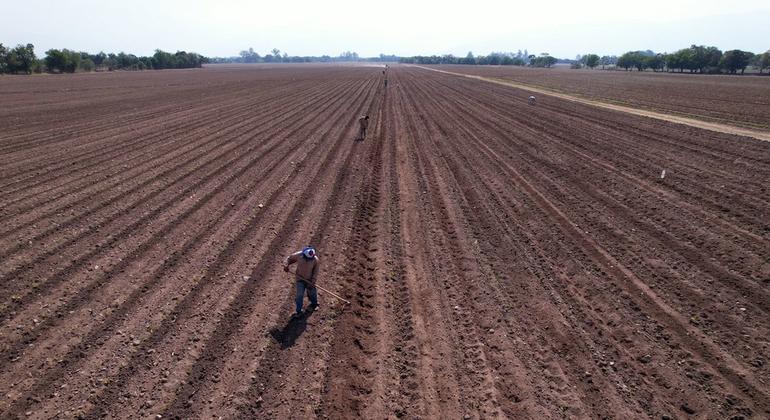Private sector urged to act as world faces $23 trillion loss from land degradation

Business leaders have been meeting at the UN Convention to Combat Desertification (UNCCD) conference being held in Riyadh, Saudi Arabia, which is focusing on drought, land degradation and restoration issues.
According to the UN, droughts have surged by nearly 30 per cent in frequency and intensity since 2000, threatening agriculture and water security, while up to 40 per cent of the world’s land is degraded, which means its biological or economic productivity has been reduced
Saplings are planted Al Adhraa national park in Saudi Arabia as part of efforts to protect the land from degradation.
Drought and land loss will have dire consequences for the climate, biodiversity and people’s livelihoods as well as businesses, large and small.
The global economy could lose $23 trillion by 2050 through degradation UNCCD has warned, while halting this trend would cost around $4.6 trillion, a fraction of the predicted losses.
The private sector can play a key role in supporting the sustainable use of land, according to the Executive Secretary of UNCCD, Ibrahim Thiaw.
Speaking at the Business 4 Land Forum at the COP16 conference, he said they provide “a critical momentum to make sustainable land management a core part of corporate and financial strategies.”
COP16 is the biggest global meeting of its kind on land degradation and restoration and the presence of a wide range of business leaders suggests they recognize the urgent need to support the healthy use of land.

Women in Niger prepare fields for the rainy season as part of an anti-desertification initiative.
“Shifting towards nature-positive operations, supply chains, and investments, is not only about environmental sustainability,” said Ibrahim Thiaw, “but about the long-term profitability and resilience of businesses.”
Members of the Business 4 Land initiative are urged to act in three key areas.
Speaking to delegates at the meeting, Philippe Zaouati, CEO of the MIROVA sustainable investment fund, said that “companies stand to gain significantly by transforming their value chains to incorporate sustainable practices, not only to reduce their impact on nature but also to seize economic opportunities,” adding that “mobilizing funding for land restoration requires a concerted effort by the public and private sectors.”
There have been some early successes during the first days of COP16 in terms of unlocking international funding with $12 billion pledged to land restoration efforts.
The Arab Coordination Group pledged $10 billion while the OPEC Fund and the Islamic Development Bank committed $1 billion each to the Riyadh Global Drought Resilience Partnership, alongside the $150 million dollars provided by Saudi Arabia to operationalize the initiative.
Henri Bruxelles, the Chief Sustainability Officer of the global food and beverage company, Danone, reiterated the importance of global collaboration.
“Collaborating across sectors of society is vital to address the intertwined climate and water challenges, to guarantee food security and nutrition and to secure the livelihoods of the communities that feed the world,” he said in order to “build a sustainable food system.”
More about Business 4 Land (B4L)
B4L is UNCCD’s main initiative to engage the private sector in sustainable land and water management. It helps companies and financial institutions manage risks and seize opportunities tied to land degradation and drought.
B4L aims to restore 1.5 billion hectares of land by 2030, contributing to Land Degradation Neutrality (LDN), a global commitment to achieve net zero land degradation by 2030, as well as enhancing drought resilience.



